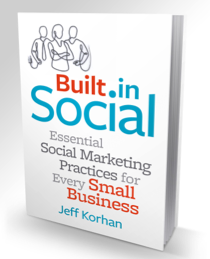
When it comes to tools and techniques, writers are much like golfers: Some of our trusted tools are practical, while others are pure superstition. It doesn’t matter.
Even when you master the fundamentals, it’s comforting to know you have a few tricks in your bag for creating content that helps your communities.
While this list is quite lengthy, nearly every one of these tools, techniques, and resources proved to be invaluable for writing my first traditionally published book. In fact, many of them were discovered on the way to finishing my book on time.
While you may be eager to learn some new tools, none of them will do you any good if your writing is not grounded in the fundamentals. So, let’s then start with a review of proven practices that many notable authors share.
Methods and Practices
#1 – Find the Intersection of Ideas – When you integrate what’s new with what is familiar, you make your content more relatable and relevant.
#2 – Just Start Writing – Writers block is the result of not having a valid writing process. The only way to find your writing process is to start writing. If you do this you’ll occasionally make breakthroughs that will shape that process.
#3 – Write to Remember – Writing is a creative process whose foundation is the memories that have long been pushed into the background. Bringing them to the surface naturally leads to finding their relevant intersection with what is present and familiar, with the result being something new.
#4 – Write to Completion – Whether you are writing an article or a chapter, have the discipline to take it to completion. You learn from experience that the thought process that goes into mobilizing to write anything has to be repeated if you fail to finish.
#5 – Close the Door – Writing for most is a very personal experience. For that to happen you have to remove distractions to bring your attention inward. Novelist Stephen King is fond of saying, “Write with the door closed, rewrite (edit) with the door open.
#6 – Write to a Question – Writing to a question gives you perspective. It naturally puts you in conversational mode, thereby making your writing more purposeful.
#7 – Set it Aside – When you flesh out ideas and then set them aside, your subconscious will always be working in the background to make them better. This is what gives you those big moments of inspiration in the shower.
#8 – Physically Move – Movement changes your state of mind. Take a walk, get on the treadmill, or simply run an errand.
#9 – Talk to Yourself – We are all silently talking to ourselves every day. However, if you need to make a breakthrough, it can help to shake things up by asking yourself aloud: “What is the theme? What is this piece about?” If necessary, get mad. It gets the juices flowing!
#10 – Take a Shot of Courage – While not a generally accepted practice, more than a few notable authors have been known to consume adult beverages to “inspire” their writing. I doubt it’s a smart long-term practice, but it may give you the courage to walk away from some of the words you’ve written, to then start fresh finding the right ones.
Tools and Techniques
#11 – OmmWriter – This focusing tool for your Mac or PC is one of my favorites for the first draft. You choose the screen background, instrumental music, and even the keystroke sound to create an immersive experience.
#12 – Focus@Will – When I’m refining my writing I’ll use Focus@Will. I suggest upgrading to the paid version to get the full selection of music that they claim is backed by neuroscience research. All I know is it works for me, and that’s enough.
#13 – Ambiance – If the ambient sounds of nature put you in the mood, then Ambiance is the mobile app for you. They regularly add new sounds to choose from.
#14 – Bruce BecVar – As a practicing mediation instructor, I became familiar with the original compositions of Bruce BecVar that are designed to activate (Kapha), calm (Pitta), or ground (Vata) ones energies. Designed in partnership with Deepak Chopra, MD, the Magic of Healing series will help you achieve a balanced body-mind for maximizing your productivity.
#15 – Legal Pad – Sometimes you come across a productivity tool that is amazingly simple, yet powerful. Screenwriter and author Steven Pressfield shared how he used the Foolscap Method to create the structure for The Legend of Bagger Vance, by outlining the Acts I, II, and III on just ONE sheet of legal pad paper, otherwise known as foolscap. You can use it to find the shape of your articles, stories, book, or any other writing project.
#16 – Notebook – For years I’ve used Moleskine notebooks to journal ideas every morning, or for taking notes throughout the day. I’m planning to try the Ecosystem notebooks which, unlike the Moleskine, have all the pages perforated. This is useful if you prefer to tear out and scan pages to upload them to Dropbox or Evernote. Both are available on Amazon.
#17 – Index Cards – Carry them to always have something to write on. I purchased a leather “card wallet” from Levenger that includes a small pen that fits into a jacket or jeans pocket.
#18 – Google – When you are writing to a theme, Google it to see what is out there now. You will discover what hasn’t been addressed, and learn which headlines or titles are most commonly searched for by your target audience.
#19 – WhiteBoard – My whiteboard serves to capture ideas and keep them in my awareness for use in upcoming works of writing. I use the GeniusScan app to store them in PDF format to the cloud to have them available when traveling.
#20 – Checkvist – Checkvist is a powerful keyboard driven software application for managing checklists online. It’s key features are speed, sharing across multiple devices and users, tagging, and so much more. The small amount for the upgraded version is well worth it.
Books and Online Resources
Books
#21 – On Writing – If you are not familiar with Stephen King’s On Writing, get ready for an unexpected ride. As he explains where his ideas come from, how he makes them better, and more, you will get an intoxicating dose of his wicked sense of humor. The audio version read by the author is highly recommended!
#22 – Why We Write – Twenty of America’s notable novelists share their secrets of a successful writing career in this recently published book. Their respective practices are both inspiring and informative.
#23 – Do The Work – Most writers resonate with Steven Pressfield’s classic, The War of Art. Yet, I’ve found his follow-up Do The Work to be more direct, and therefore useful for overcoming the dreaded Resistance that stops us from creating our best work.
#24 – Improv Wisdom – After nearly a decade in print, Patricia Ryan Madson’s little book on improvisation is a goldmine of exercises that will have you forever convinced that there is no such thing as writers block.
Websites
#25 – CopyBlogger – In addition to the daily blog articles, Copyblogger offers hundreds of free resources, including tutorials, eBooks, webinars, seminars, and podcasts. Sign up for a free MyCopyblogger.com account to get started.
#26 – Brain Pickings – BrainPickings is a site for the more intellectually inclined. This weekly newsletter arrives Sunday mornings, and often contains hard-to-find insights from some of the world’s greatest writers and thinkers.
#27- Steven Pressfield – Steven Pressfield Online is a blog I always look forward to reading, probably because you get the truth about the craft from an accomplished writer who faces his writing demons every day, just like you and me. If you sign up for his First Look Access he’ll email it to you, along with some nice benefits from time-to-time, such as free digital copy of one of his books.
Do you need a little push to start writing? Here are three practical reasons for doing the work.
About the Author: Jeff Korhan, MBA, is the author of Built-In Social: Essential Social Marketing Practices for Every Small Business – (Wiley)
He helps mainstream businesses adapt their traditional growth practices to a digital world. Connect with Jeff on LinkedIn, Twitter, Facebook, and Google+.



